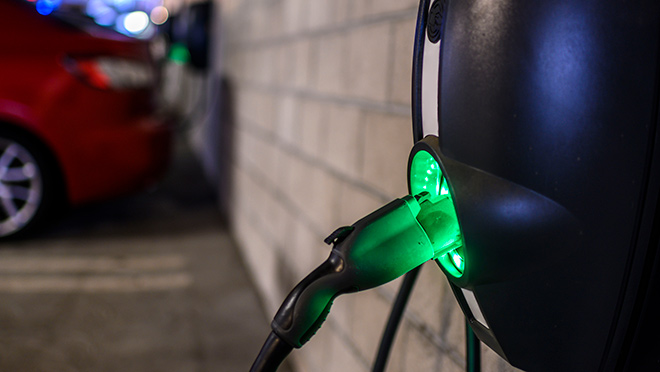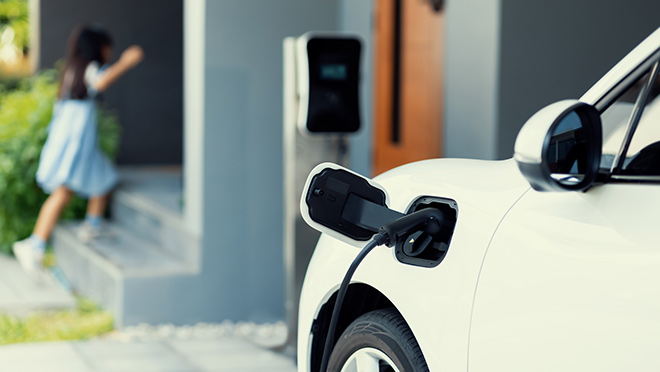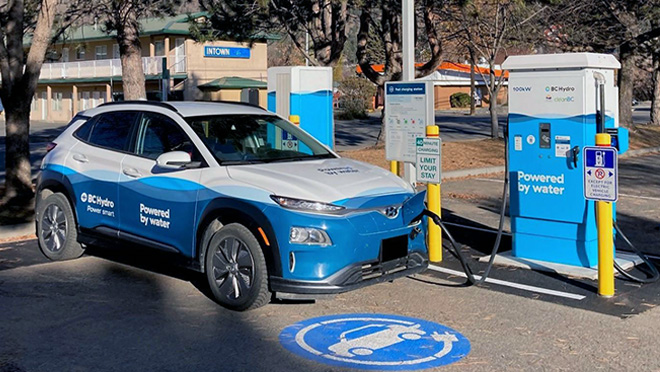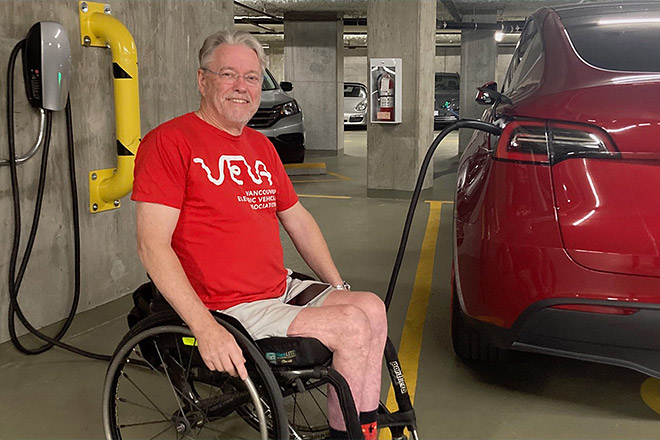EV charging at stratas: metering options and rates

Common area meter options, plus a dedicated meter option for residents
When it comes to monitoring and paying for electricity from electric vehicle charging in strata complexes, questions abound. So we've consulted Reid Arkinstall, BC Hydro's transportation electrification program manager, to help Alliance members sort through metering options and rates implications.
"At times there's been a misunderstanding by some customers and the electrical industry that stratas can select any rate and metering combination they want," said Arkinstall. "We'd like to clarify what the metering and rate options for condo and apartment residents are."
There are three ways residents living in condos and apartments can monitor and pay for EV charging. Here's a look at those options, and the rates customers will be billed.
Option 1: Use an existing common account
Stratas can request to add EV chargers under an existing common use area account – the account used for electricity in common spaces such as hallways, parkades, and stairwells.
If the strata wants to pass on the electricity costs to the residents for using the EV chargers, the strata will need to find a way to administer the billing and payments related to EV charging separately from the BC Hydro account.
The most common payment approaches have been time-based or a flat monthly fee, with many stratas and residents having the payment collection and reimbursement managed by an EV charger company for a service fee.
Measurement Canada has also recently issued a temporary dispensation that allows owners of EV charging devices to be billed based on the amount of energy used (i.e. in kilowatt-hours). Learn more about the dispensation and Measurement Canada's requirements for owners wanting to take advantage of this option at the Measurement Canada site.
Which rate is applied?
Electricity use from the EV charger(s) will be billed under the existing rate for the building's common use area account. This is typically either the Residential Conservation Rate or one of the General Service Rates.
Option 2: Employ a separate meter and account for all charging
Stratas can request a separate meter to measure the electricity use from EV chargers, and use an account that's separate from an existing common use account.
"This is proving to be a popular option for many stratas" said Arkinstall, noting that only one meter is installed to record the usage for all EV chargers together.
The electricity use from the EV charger(s) will be billed on a separate account from the existing common use account. Like Option 1 above, if the strata wants to pass on the electricity costs to the residents for using the EV chargers, the strata will need to administer the billing and payments of the EV charging separately from their BC Hydro account.
Which rate is applied?
Stratas with no commercial operations in their complex – such as a coffee shop or store at street level – have a choice to select between the residential rate and the applicable general service rate (depending on their peak demand). Mixed-use stratas (with commercial operations) would be put on the appropriate general service rate according to their electrical load.
Option 3: Install separate meters for individuals
Where there's only a limited appetite for EV adoption in a complex, or in a smaller building, stratas may find it advantageous to allow individuals to set up dedicated meters for their EV charging. Sometimes that won't be possible – there may not be space for another meter, for example, in an electrical room. But there are advantages.
A unit owner has to obtain approval from the strata for the electrical work required to install the additional meter, and is responsible for the costs of the additional meter installation. For residential customers, the electricity use from EV charging will be combined with the owner's unit electricity use and billed under the existing residential account.
Under this option, residents pay directly for the energy they use, and they can also apply to opt into the upcoming optional time-of-day pricing.
"Where the infrastructure in the building makes this feasible, this can be a very attractive option," said Arkinstall. "It allows a resident's charging to be tied to their home account, so from a billing standpoint, it's simple. And the strata doesn't have to worry about cost recovery.
"However, what's really important to know about this metering option is that it's not compatible with EV load management configurations, as it requires a dedicated electrical circuit. Dedicated circuits can make sense in some buildings, but it's at odds with the best practice approach of using EV energy management systems to make the most efficient use of power and avoiding unnecessary electrical service upgrades while meeting the charging needs of all residents today and in the future."
Which rate is applied?
Residents will be billed at the residential rate. Commercial customers who operate in a strata and opt for a dedicated meter will, however, be billed on a separate account under one of the general service rates.
For BC Hydro, the preference is the EV Ready model
The EV Ready incentives program provides apartment, condo and townhome complexes with rebates not just for the EV chargers, but also for the electrical upgrades needed to make the complex ready for EVs. It's available to stratas where each resident has at least one parking stall equipped with an electrical connection point capable of powering a Level 2 EV charger. And it makes for a simple and expedient process for residents to install an EV charger in the future, when their need arises.
"From our perspective, the EV Ready approach is dramatically more effective at setting condo, apartment and townhome buildings up for the future," said Arkinstall. "It's preferable to installing one, or a few EV chargers, without any consideration for the future. With an EV Ready project, it allows stratas to develop a comprehensive approach that considers electrical design, changes to strata rules and bylaws, and procurement of EV chargers, including the best way to track and bill for EV charging use."


